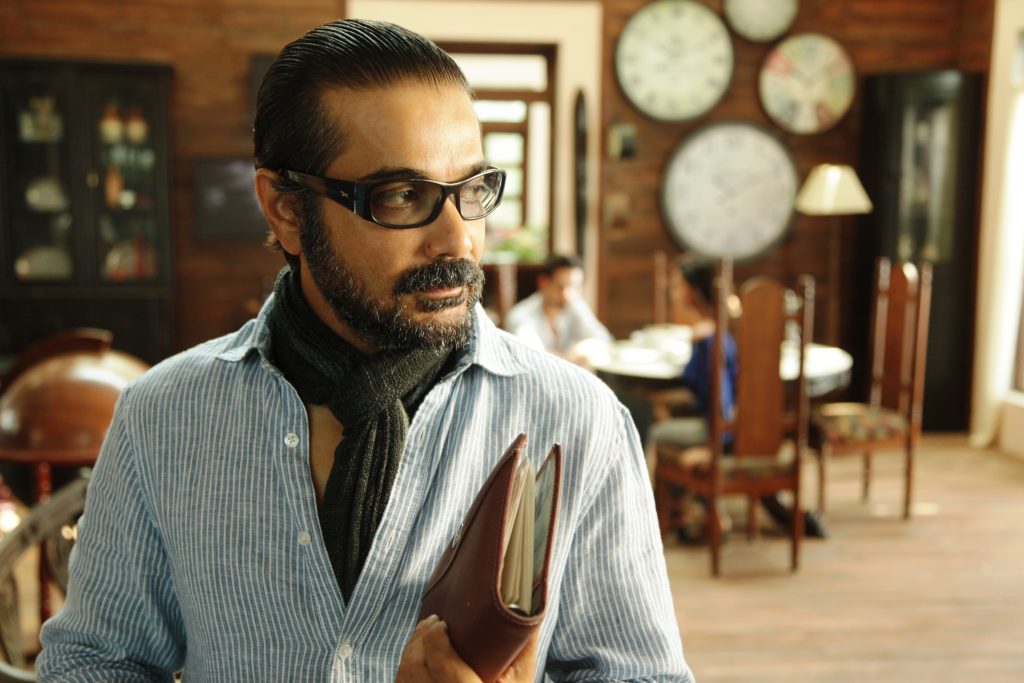Touted as an erotic thriller, there is an element of the erotic in Khawto but very little of the thriller. Perhaps it could be categorized as a watered down version of an erotic film based on adultery and vaguely defined as ‘a hybrid film genre that tries to be a finely nuanced combination of a thriller film and soft-core sex with illicit romance’.
Khawto is a big budget, lavishly mounted production marketed as an erotic thriller. The ‘erotic’ thread lies in the adulterous relationship between the famous journalist-writer Nirbed Lahiri (Prosenjit) and his wife’s friend’s wife, Damayanti (Paoli Dam), whom he lusts for at first sight at a party in his house. But the torrid affair is the consequence of a merciless quid pro quo on Nirbed’s part. He helps Damayanti’s husband get a job in his newspaper office and unknown to this man (Rahul Banerjee) besotted with his wife, he asks the dusky beauty for sexual favors. Damayanti reluctantly surrenders to his demands but gradually begins to enjoy the torrid encounters and refuses to let go when the going gets tough and Nirbed wants ‘out’.
The first half of the film is slow, almost to the point of boredom, It is not even enlivened by the torrid, intimate scenes of a young couple (Tridha, Ronodeep) who visit a seaside resort to enjoy sex. The young girl meets Nirbed at the resort. Later, Nirbed, who has cut himself off from the mainstream and has chosen complete social isolation, begins to narrate the story of his last novel Khawto to the pair. The voluntary social seclusion of Nirbed is stretched so far that it seems more like the director, Kamaleswar Mukherjee, intended to ‘use’ form and technique to enhance the content but effecting the exact opposite instead – the content is both sucked and drowned by the form. The visuals are drowned under splashes of red which may have offered cinematographer Soumik Halder the golden opportunity to play around with colors but actually intrude into the smooth narration of the story. Events begin to escalate much after the interval when four couples bunch together with the kids for a holiday at Palamau. This marks the turning point in the film which becomes explosively titillating and thankfully, hastens the pace of the drama to fit into its intended genre. The pace never stops from this point, flashing back and forth through time and space, till it all culminates in an electrifying climax.
There is an element of impersonation in that all the major characters have more than one name – one is their real name and the other is the one Nirbed has christened them with in his last novel. This splits the characters into two – their real selves and their fictionalized ones. One even has three names. Paoli’s real name is Damayanti Chakarborty but the two names Nirbed gives her are Antara and Aslesha. Nirbed himself was originally called Dhruba Lahiri and Nirbed is his author-pseudonym. This raises the question of honesty. How honest is Nirbed in his narration of his last novel and how much does his writer’s temptation to fictionalize the truth take over and from which point? However, the overload of Nirbed dominating almost every single frame of the film tends to let go of the golden opportunity of exploring the concept through yet another fictionalized medium, that of film.
Prosenjit is very good in his new avatar as an arrogant writer filled with attitude who not only leads life on his own terms but also suffers no pangs of guilt for exploiting a young housewife for sexual favors. It is a noirish and shaded character he has not played before but script wise, Mukherjee needed to explore it more deeply. In the flashbacks, when he is supposed to be quite young, his face looks too lined for girls to swoon over him, never mind the charisma he carries as journalist and writer. He appears to be an expert in international cuisine though there is no backup in his past to support this theory. Paoli is outstanding in one of the most multi-layered roles in her career that fluctuates sometimes quietly and often violently from one emotion to the next. Rahul as her simple, loving husband is remarkably expressive while Raima is more or less wasted in the role of a wronged wife because her character is not fleshed out at all. The children are mysteriously ignored by the script.
The intimate scenes of sex between the younger pair and the two older pairs are beautifully handled, often presented through frosted glass shower curtains awash with water and once under a real waterfall. The background music is good and the economy of songs intensifies the emotional texture of the proceedings though they do not quite jell into the convoluted narrative.
Touted as an erotic thriller, there is an element of the erotic in Khawto but very little of the thriller. Perhaps it could be categorized as a watered down version of an erotic film based on adultery and vaguely defined as ‘a hybrid film genre that tries to be a finely nuanced combination of a thriller film and soft-core sex with illicit romance’. All said and done, Khawto could have been much better if it had worked more on the disappointing fare that happens for more than the first half of the film.
Bengali, Thriller, Color


